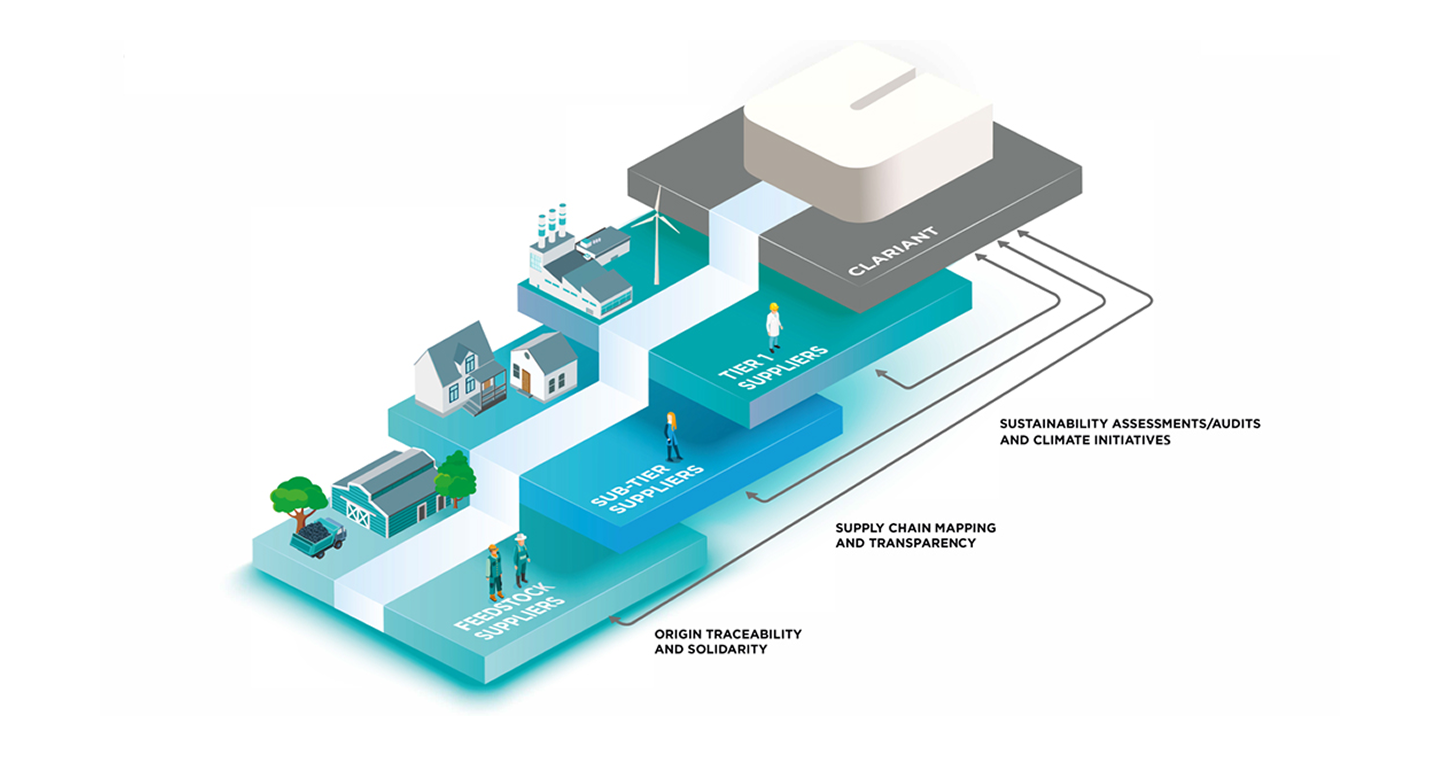Our supply chains are global and complex. Working with our suppliers and experts in the field, Clariant strives to manage the specific environmental and social issues connected with the sourcing of bio based raw materials such palm derivatives and minerals such as tantalum, tin, gold and tungsten.

Working with our suppliers to lower our collective carbon footprint
Supply chain related emissions are the main source of Clariant’s corporate carbon footprint. In 2020 Clariant defined an absolute reduction target for its scope 3 greenhouse gas emissions in line with the Science Based Targets initiative (SBTi). For Clariant the most relevant scope 3 emissions are those coming from the production of raw materials purchased, transportation and distribution, fuel- and energy- related activities, and end-of-life treatment of sold products (e.g. incineration, landfill). The company targets a 14% absolute reduction in scope 3 greenhouse from purchased goods and services between 2019 and 2030.
A focus on environmental protection and sustainability
The use of renewable materials in the chemical industry is becoming ever more important, both in terms of long-term costs and as regards environmental protection and sustainability. Clariant intends to steadily increase the use of renewable raw materials in its products. In fact, it’s a key lever of our emission reduction effort. Clariant uses oleo-chemicals derived from palm and palm kernel oil in its surfactants, emulsifiers, and preservatives. To ensure the sustainable sourcing of these raw materials, Clariant has certified all production sites that are processing palm oil-derived raw materials under the sustainability certification scheme of RSPO (Roundtable on Sustainable Palm Oil). In our Global Policy on Sustainable Palm Oil , Clariant has set out commitments to ‘No Deforestation, No Peat and No Exploitation’ (NDPE), which apply to all palm oil, palm kernel oil, and their derivatives from our supply chains globally.
Our comprehensive approach includes:
Responsible sourcing
We source from suppliers compliant with No Deforestation, No Peat, No Exploitation (NDPE) principlesCollaboration
We actively work with our supply chain partners, stakeholders, and customers to improve transparency and traceability
Community support
We support smallholder inclusion and improvement of local livelihoodsTransparency
We share our progress annually through sustainability reporting
Our suppliers must protect High Carbon Stock areas, avoid peat development, support local communities, and maintain transparent operations. We address non-compliance through our established guidelines and continuous improvement.
Clariant offers more than 200 products with the mass balance certificate. For the mass balance certification, sustainable palm oil from certified sources is monitored administratively in the chain, but is mixed with ordinary palm oil. A company is compliant as long as the input-output quantities are balanced. Clariant will continue to extend the certified product portfolio in order to help its customers meet demand for certified palm ingredients. In addition, Clariant encourages its suppliers that use palm-based oils or their derivatives to sign up and endorse the principles developed by the RSPO. RSPO membership is a supplier selection criterion for palm-based materials.
Clariant is also seeking alternative biobased raw materials, as the non-food-competing by-product of edible rice bran oil production or ensuring secure and responsible sourcing for our active ingredients Southern Cross Botanicals and IBR are members of the UEBT, a non-profit organization that promotes the “sourcing with respect” of ingredients from biodiversity.
Our commitment to conflict-free sourcing
In light of the risks of adverse impacts which may be associated with extracting, trading, handling and exporting minerals from conflict-affected and high-risk areas, Clariant is committed to the responsible and ethical sourcing of minerals originating in conflict-affected and high-risk areas, in line with our overall commitment to respect human rights.
Our approach is informed by the OECD Guidance for Responsible Supply Chains of Minerals from Conflict-Affected and High-Risk Areas and aligned with the final Dodd Franck Act Rule, enforced by the US Security and Exchange Commission, as well as the EU Conflict Minerals Regulation (2017/821), which defines supply chain due diligence for importers and processors.
Clariant’s approach includes the identification and mitigation of risks in relation to conflict minerals, tracking, and monitoring our progress.
View our position paper on conflict minerals in the downloads section on our page.
Our commitment to human rights and ethical sourcing
At Clariant, we believe that responsible business practices and sustainable supply chains are fundamental to our success and our contribution to society. We are committed to upholding human rights and meeting our legal obligations across our global operations.
We adhere to stringent regulations worldwide, including the California Transparency in Supply Chains Act, the Swiss Responsible Business Initiative (KVI), the Norwegian Transparency Act, and the German Supply Chain Due Diligence Act (LkSG). Our approach goes beyond compliance to embrace ethical leadership in our industry.
As an active member of Together for Sustainability (TfS), we work alongside other chemical industry leaders to elevate sustainability standards throughout our supply chains. This collaboration enables us to conduct thorough supplier assessments through EcoVadis, ensuring our partners meet international labor and human rights standards.
We invest in regular sustainability training for our procurement teams and incorporate sustainability objectives into performance evaluations. This approach ensures we continuously strengthen our human rights due diligence and create a positive impact throughout our value chain.
Clariant’s Code of Ethics is aligns with International Labor Organization principles and applies to all employees and business partners. We maintain confidential reporting channels for any concerns, ensuring transparency and accountability at every level of our organization.
Clariant’s Integrity Line: We appreciate our external partners' cooperation by reporting any actual or alleged violation of Clariant’s commitments stated in our Code of Ethics and other related documents.

